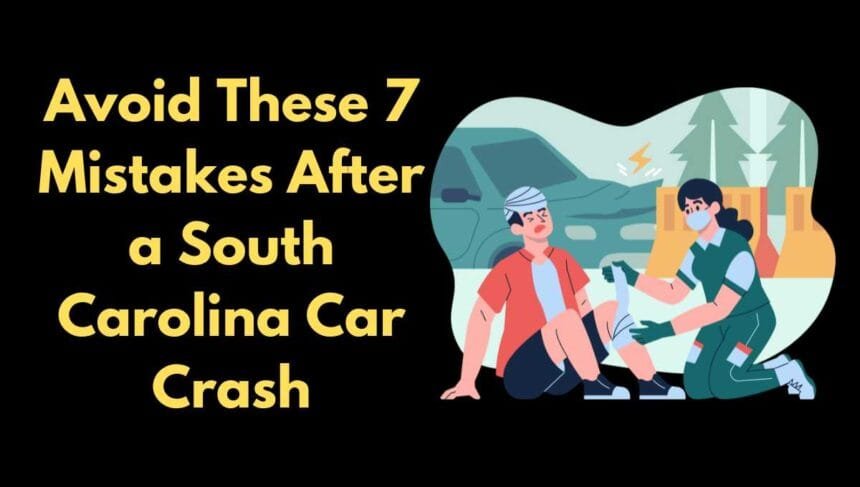A car crash is a sudden, stressful experience one that can lead even the most level-headed person to make poor decisions.
In the chaotic moments that follow an accident, many people unknowingly make mistakes that end up costing them financially, legally, or in terms of their long-term health.
If you’re driving in South Carolina or anywhere in the U.S. knowing what not to do is just as important as knowing what steps to take.
This blog post explores the 7 most common mistakes people make after a car accident in South Carolina and how to avoid them, helping you protect your health, your rights, and your wallet.
1. Leaving the Scene Too Quickly
Why it’s a problem:
Leaving the scene of an accident, especially one involving injury or property damage is not only risky, it’s illegal under South Carolina law. (Source)
Even if you believe the crash was minor, you are legally obligated to stop, check for injuries, exchange information, and report the incident if necessary.
Consequences:
Leaving the scene can lead to criminal charges, including hit-and-run accusations. It also weakens your legal standing if you pursue damages later.
What to do instead:
Remain calm and stay at the scene until law enforcement arrives. Make sure everyone is safe and provide aid if needed. Only leave when it’s legally and practically appropriate to do so.
2. Not Calling 911 Even If Injuries Seem Minor
Why it’s a problem:
Some people skip calling 911 if the crash doesn’t appear serious or if injuries seem minor. However, the full extent of damage or injuries isn’t always obvious right away. Adrenaline can mask symptoms, and some conditions (like concussions or internal bleeding) may surface hours later.
Consequences:
Without an official police report or medical record, proving your version of the incident becomes much harder. Insurance companies may downplay your injuries or deny your claim altogether.
What to do instead:
Always call 911 after an accident. A police report serves as a crucial piece of evidence, and paramedics can assess injuries on-site even if they seem small.
3. Apologizing or Admitting Fault at the Scene
Why it’s a problem:
It’s human nature to say “I’m sorry” out of politeness, but after an accident, those words can be interpreted as admitting fault. Even if you believe the accident was your fault, you may not have all the facts and making early statements can come back to haunt you.
Consequences:
Your words can be used against you by the other party’s insurance company or legal team. In South Carolina, which uses a modified comparative negligence system, being found even partially at fault can reduce or eliminate your compensation.
What to do instead:
Stick to the facts. Cooperate with police, but don’t speculate about fault. Let investigators and insurance companies sort it out later.
4. Failing to Gather Proper Documentation
Why it’s a problem:
Relying solely on the police report is not enough. Important details can be overlooked, and documentation from your perspective can play a critical role in your case.
Consequences:
Lack of evidence may weaken your claim. Disputes about who caused the accident or the severity of damage may not be resolved in your favor.
What to do instead:
Take photos of the vehicles, the accident scene, weather and road conditions, license plates, and any visible injuries. Get names and contact information of any witnesses, and note the responding officer’s badge number and report ID.
5. Skipping a Medical Checkup
Why it’s a problem:
Even if you feel fine, skipping a medical evaluation can be dangerous. Some injuries take time to develop, and untreated conditions can worsen.
Consequences:
Insurance companies often argue that a delay in treatment means your injuries aren’t related to the crash. This can reduce or deny your compensation entirely.
What to do instead:
Get checked by a healthcare provider as soon as possible ideally the same day. Keep records of every visit, test, and treatment related to your injuries.
6. Talking Too Much to the Insurance Company
Why it’s a problem:
After the accident, insurance adjusters—especially from the other driver’s company—may contact you asking for a statement. They might sound friendly, but their goal is to minimize the payout.
Consequences:
Anything you say can be twisted or taken out of context to reduce your compensation. A recorded statement made too soon could unintentionally hurt your claim.
What to do instead:
Limit your communication. Provide only the basic facts (time, location, vehicles involved). Politely decline to give a recorded statement until you’ve spoken with an attorney.
7. Not Contacting a Local Attorney
Why it’s a problem:
Many accident victims try to handle claims on their own. But South Carolina’s comparative negligence laws are complex, and insurance companies often have teams of lawyers working to protect their interests.
Consequences:
You may receive a lowball settlement or miss deadlines that damage your claim. Without legal help, it’s easy to get overwhelmed or out-negotiated.
What to do instead:
Reach out to a qualified car accident attorney in South Carolina. Most offer free consultations and work on a contingency basis, meaning you pay nothing unless you win compensation.
A lawyer can handle paperwork, negotiate with insurers, and ensure your rights are protected.
Need Help After an Accident in South Carolina?
Don’t face it alone. A local personal injury attorney can help you understand your legal options and secure the compensation you deserve. Time matters, so take action early and protect your future.



